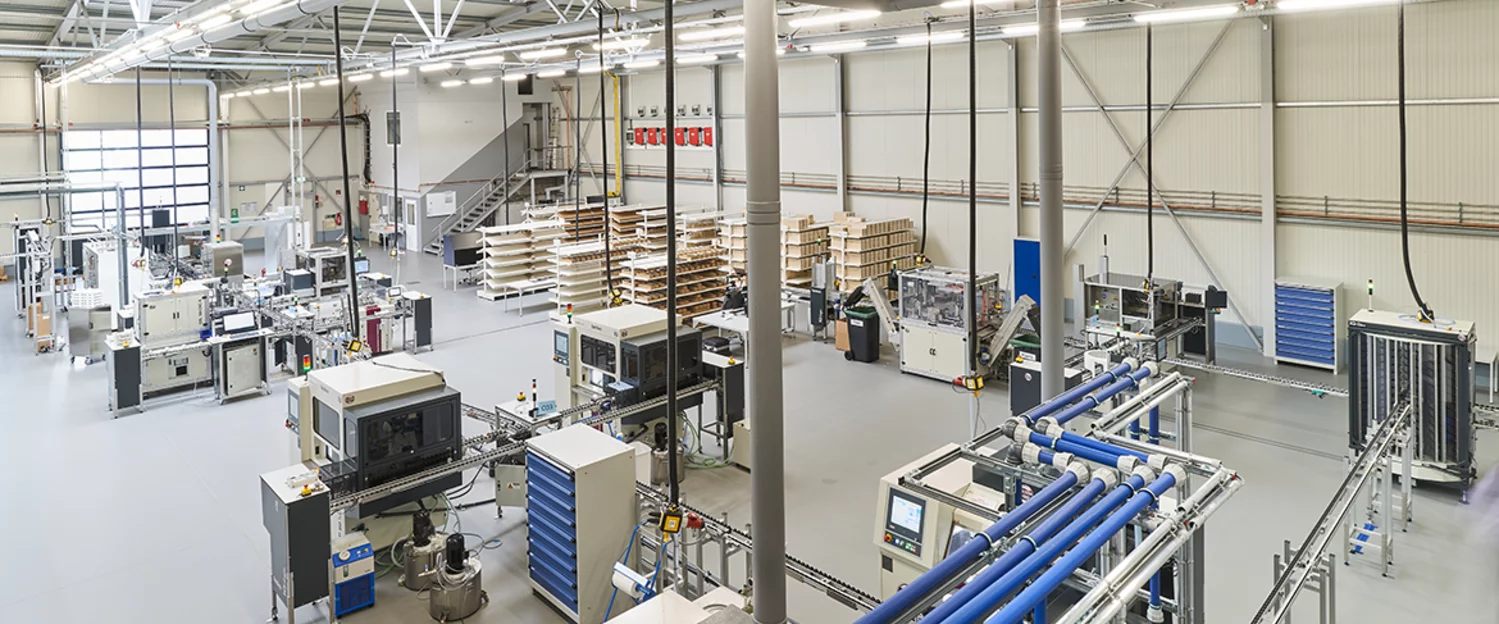Around the world, the name Leica stands for optics, precision, and the highest quality – made in Germany. This also applies to the Leica Eyecare brand with which Leica has entered the market for high-end lenses in manufactory quality. Two Schunk companies – OptoTech and Weiss Klimatechnik – contributed their expertise to the construction of the production facility, which also functions as a show lab. OptoTech designed the factory and equipped it to a large extent with machines from its own portfolio. Weiss Klimatechnik provided the air-conditioning equipment and supplied special industrial ovens.
Premium lenses – made by Leica
Corrective lenses are customised lenses for discerning customers. Whether single-focal, multi-focal, or progressive lenses: these can be further refined and personalised as required – with a wide range of options. In order ensure that the premium lenses from Leica Eyecare always meet the highest standards, OptoTech, the specialist for optical machines, was commissioned to set up a production facility. At present, around 800 prescription lenses can be produced there per day in one-shift operation. Thanks to the expansion stage already included in the planning, production can be ramped up to 500,000 lenses per year in multi-shift operation.
Innovative technologies for the optical industry
OptoTech is a specialist and innovation leader in optical manufacturing. The company was founded in 1985 and has been part of the Schunk Group since 2018. The portfolio includes a wide range of machines for precision optics, metrology, coating, and ophthalmic optics, among others. Oswin Lack, VP Strategic Accounts & Technology and a true veteran of the optical industry, still remembers the start of the project at the end of 2021. “We were commissioned to build a complete pilot factory. In view of the Corona crisis, supply bottlenecks, and a shortage of skilled labour, this was a real challenge that we were able to overcome only thanks to good cooperation and close coordination with strong partners such as Weimer in the construction sector and Weiss Klimatechnik for the air conditioning technology”.
Complex planning with expansion stages
Once a suitable hall had been found, OptoTech began planning the new production line. As a pilot factory, it had to fulfil all requirements and be fully production-ready. Possible expansion stages and scaling also had to be taken into account at the planning stage. These requirements were met by the use of modular components and the planning of open spaces for the installation of additional machines, among other things. In addition, all supply lines had to be designed in such a way that they could be quickly and easily converted to increased capacities. Because the hall had previously been used as a warehouse, a complete remodelling was necessary. In addition to the walls and floor, this affected all supply lines for water, electricity, and compressed air.
Intelligent and modular logistics
The planning team laid out the production line in a meandering fashion with various changes of direction and open spaces for future expansion stages. Logistically, the IQ-Logic system from OptoTech plays a decisive role in lab automation. In particular, the IQ-Star towers positioned at various points store and distribute lenses in a highly flexible and needs-orientated manner. For example, it is possible to take into account different cooling times for lenses or to buffer waiting times if an individual lens needs to be remanufactured.
Machines for all processing steps
In terms of machinery, OptoTech was able to use its own portfolio to perfectly organise production for high-end manufacturing with a lot size of one. The fully automatic DeBoxer unpacking system, blocking and deblocking stations, and high-end turning and milling centres for free-form lenses and polishing machines were among the equipment used. In terms of finishing, the spectrum ranges from tinting and engraving to hard coating for resistant surfaces. Another highlight of the production process is the specially developed logistics boxes, which are the central components of the unique paper-free lens production. The boxes are equipped with bar and DMC codes as well as an RFID tag so that all glass and production-relevant information can be retrieved at any time using the central lab management software.
Refrigeration technology for process environments
In some areas, the process environment is also an important component in the production of high-quality lenses. Certain climatic conditions and air purities must be maintained, particularly during tinting and tempering. After an intensive analysis, Weiss Klimatechnik developed a customised and efficient overall concept. “We have built the concept around our Vindur Compact air conditioning unit. A sufficiently large chiller with a buffer tank was provided for the cooling system during the planning stage so that we can easily retrofit additional cooling for the hall at a later date”, says Kai-Uwe Hölzel, Head of Technical Sales & Planning
Vindur® Compact air conditioning unit
Different production and room conditions had to be taken into account for the supply and exhaust air ducting. For example, turning and milling generate exhaust air at a relatively high temperature; in the heat treatment shop in a clean room, it is important that the air humidity is not too high despite higher air exchange rates in order to ensure a stable process. “The challenge for us was to combine various requirements in a single system and cover short-term demand. By using our tried-and-tested standard devices, we were able to quickly offer a reliable solution”, says Hölzel.
Companies of the Schunk Group hand in hand
One of the special features of the new pilot production is the close co-operation between the various Schunk companies. In addition to optical machines from OptoTech, Weiss Klimatechnik in particular made a contribution. In addition, seven floor-standing ovens and one continuous oven from the Strategic Business Area Heat Technology from Weiss Technik are in use. OptoTech draws an overall positive conclusion: “We are delighted to have realised the project so successfully in such a short time. We’ve shown how well cooperation works in the Schunk context and what is possible when everyone works together. We are proud and pleased to have laid the perfect foundation for a possible further roll-out with the modular eyeglass factory for Leica Eyecare”.

